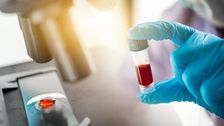News
Coronavirus Antibodies Last For
Coronavirus antibodies last for at least six months after infection for the majority of people who have had the virus, according to a new study.
The study from UK Biobank, the UK’s major biomedical database and research resource, looked at how long antibodies persisted in those who were infected.
According to the research, 99% of participants who had tested positive for previous infection retained coronavirus antibodies for three months after being infected, while 88% did so for the full six months of the study.
The results follow early evidence from Public Health England’s SIREN study, which found people infected with COVID-19 in the past are likely to be protected against reinfection for at least five months.
Researchers say the results of the study from UK Biobank indicate antibodies produced following natural infection may “provide a degree of protection for most people against getting infected again for at least six months.”
Naomi Allen, UK Biobank’s chief scientist, said: “This important study has revealed that the vast majority of people retain detectable antibodies for at least six months after infection with the coronavirus.
“Although we cannot be certain how this relates to immunity, the results suggest that people may be protected against subsequent infection for at least six months following natural infection. More prolonged follow-up will allow us to determine how long such protection is likely to last.”
For the six-month period from the end of May 2020 to the beginning of December 2020, UK Biobank collected monthly blood samples and data on potential symptoms from 20,200 UK Biobank participants and their adult children and grandchildren.
The study also found the proportion of the population with antibodies to SARS-CoV-2 (which indicates past infection) rose from 6.6% at the start of the study period, to 8.8% by the end of it.
There was no difference in prevalence by gender, but the proportion of participants with detectable antibodies was highest in younger people (13.5% among those under 30) and lowest in the elderly (6.7% among those over 70), according to the study.
The prevalence of SARS-CoV-2 was highest among participants of Black ethnicity (16.3%) and lowest among those of white (8.5%) and Chinese ethnicities (7.5%).
The most common symptom associated with having coronavirus antibodies was a loss of sense of taste and smell, which was reported by 43% of positive tests.
Around one quarter (24%) of positive participants were completely asymptomatic, and 40% did not have one of the three classic Covid-19 symptoms – fever, persistent dry cough or loss of sense of taste or smell.
Patrick Vallance, the UK government’s chief scientific adviser, said: “These latest results provide useful confirmation of the maintenance of antibodies to SARS-CoV-2 over six months.
“Having the results of the study available within UK Biobank’s rich resource will allow further understanding of the disease impact over time.”
This article originally appeared in HuffPost UK.
Experts are still learning about COVID-19. The information in this story is what was known or available as of publication, but guidance can change as scientists discover more about the virus. Please check the Centers for Disease Control and Prevention for the most updated recommendations.
Read more

